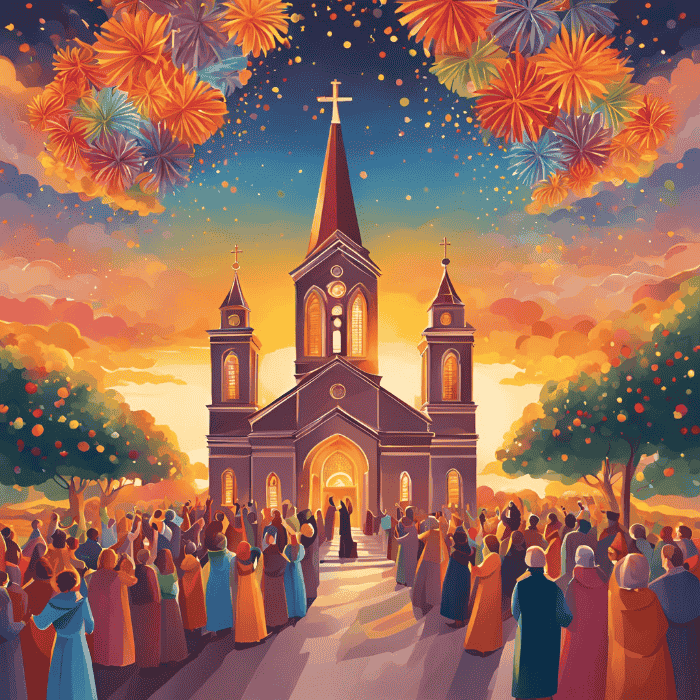
Every year on September 1st, Orthodox Christians mark a special occasion: the Ecclesiastical New Year, also known as the Church New Year. While many of us associate New Year’s celebrations with fireworks and resolutions in January, this date holds a deeper, spiritual meaning for the Orthodox faithful. It’s a time of reflection, gratitude, and renewal, rooted in centuries of tradition. But why September? Let’s take a closer look at its origins, spiritual significance, and relevance today.
Tracing the Roots of the Ecclesiastical New Year
To understand the importance of the Ecclesiastical New Year, we have to travel back to the 4th century, during the reign of Constantine the Great. At the time, the Roman Empire introduced a system called the Indiction, a 15-year cycle used primarily for tax purposes and administrative organization. Interestingly, this cycle always began on September 1. Over time, the Church adopted this date as the starting point for its liturgical calendar.
The choice wasn’t arbitrary. September 1 aligned with the natural rhythms of life in an agricultural society. It marked the end of the summer harvest and the beginning of preparations for a new planting season. For the Church, this alignment symbolized renewal and the cycle of life, themes central to the Christian faith.
Beyond its practical and agricultural roots, the date also connects to the creation of the world in Byzantine tradition. According to this calendar, the world was created on September 1, emphasizing the connection between the natural world and God’s divine plan.
A Time for Renewal and Reflection
For Orthodox Christians, the Ecclesiastical New Year isn’t just about starting a new calendar—it’s an opportunity to renew their spiritual lives. The day serves as a reminder to pause and reflect on the blessings of creation and their role as stewards of the world.
Renewal and Repentance: The Church invites the faithful to examine their lives, seek forgiveness for past shortcomings, and set new spiritual goals. It’s a fresh start, much like the secular New Year but with a focus on deepening one’s relationship with God.
Thanksgiving for Creation: Gratitude plays a significant role in this celebration. The liturgical year begins by thanking God for the beauty and abundance of the natural world and acknowledging humanity’s reliance on His providence.
Stewardship of the Earth: Modern observances have added a focus on environmental care. Orthodox Christians are called to reflect on how their actions impact the planet and to recommit to preserving God’s creation.
Liturgical Observances and Traditions
In Orthodox churches, the Ecclesiastical New Year is marked with special prayers, hymns, and readings. These liturgical elements emphasize themes of renewal, thanksgiving, and God’s blessings for the year ahead. Two key hymns, the Apolytikion and Kontakion, are often recited, asking for divine guidance and protection:
“Creator of the universe, setting times and seasons by Your sole authority, bless the cycle of the year of Your grace, O Lord…” (Apolytikion)
These prayers serve as reminders of humanity’s dependence on God and the importance of aligning one’s actions with His will.
Modern-Day Relevance: Caring for Creation
In 1989, the Ecumenical Patriarchate of Constantinople declared September 1 as a day of prayer for the environment, urging Orthodox Christians worldwide to reflect on their responsibility toward God’s creation. This call to stewardship is especially relevant today, as climate change and environmental degradation threaten the planet.
Patriarch Bartholomew, often referred to as the “Green Patriarch,” has championed this cause, reminding the faithful that care for the environment is a fundamental expression of their faith. His message is clear: humanity’s relationship with creation must reflect gratitude, humility, and responsibility.
Conclusion: Embracing Renewal
The Ecclesiastical New Year offers a profound reminder that faith is not confined to Sundays or church walls. It’s woven into every aspect of life, from our care for the environment to our relationships with others and our personal spiritual growth.
As Orthodox Christians begin this new liturgical year, they are encouraged to:
Reflect on their spiritual journey.
Give thanks for the blessings of creation.
Renew their commitment to God and His teachings.
So, as September 1 approaches, let it be more than a date on the calendar. Let it be a time to embrace renewal, stewardship, and gratitude, aligning your heart and actions with God’s divine purpose for the year ahead.
